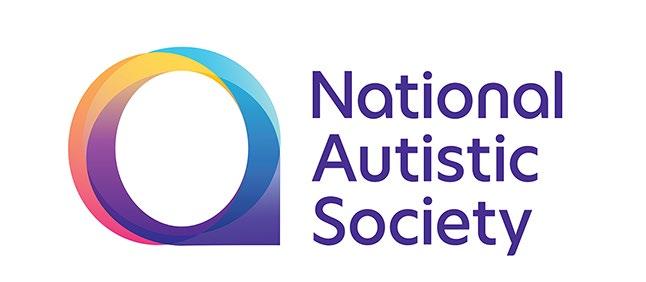

Spectrum The

produced by and for autistic people
About the Spectrum
The Spectrum is produced by and for autistic adults. We welcome submissions on any topic from autistic people who are over 18.
The Spectrum is published quarterly, in January, April, July and October, in print and online.
To submit an item to the Spectrum, please go to www.autism.org.uk/theSpectrum and follow the link to submit your work.
Although most issues are themed, submissions on any subject are welcome. Only some of the magazine’s content will follow the theme. All submissions may be edited, especially for privacy, libel and for fitting the space available.
History
This magazine was founded as Asperger United in 1993 by Pamela Yates and Patricia Howlin, in association with the Maudsley Hospital, and Mark Bebbington and Judy Lynch of the National Autistic Society.
This was in response to a recognised lack of services for autistic people and the potential for self-help and networking as a means of support.
The purpose of the magazine was to develop a publication that was truly the voice of the people it was aimed at.
Please note that the Spectrum receives many submissions each quarter so it is not possible to respond to every one, nor for every contribution to be printed. Discussions on editorial choices will not be entered into.
Pieces that appear in the Spectrum are credited using the author’s first name only, unless the author requests an alias. This is done to protect their privacy.
The National Autistic Society promotes the Spectrum on social media using pieces selected from the magazine.
Please note: the views expressed in the Spectrum are not necessarily those of the Editors, the National Autistic Society or those involved in the publication of the magazine.
The Spectrum online version is available at www.autism.org.uk/theSpectrum
You can email the Spectrum at spmag@nas.org.uk
The name the Spectrum was suggested by dozens of people and chosen in an online poll in 2018.
Former Editors and Sub-editors are Richard Exley, David Wright, Martin Coppola, Ian Reynolds, John Joyce and the Goth.
In 2024, Fiona and Charlotte, autistic members of the National Autistic Society’s Content team, became joint editors.
The leaves fell and October turned into November. Apologies for having to welcome you to your October issue in November.
You will notice this issue now reflects the National Autistic Society’s current branding and design. We have kept much of the existing layout of the magazine, but have tried to make it clearer and easier to read. We hope you like it.
The magazine is, as ever, full of brilliant artwork, articles, poems and stories by autistic people.
There will also be no suggested theme for the January issue and we welcome submissions on any topic of your choosing. Remember to complete a permissions form for your submission, as we can’t publish anything without it.
Please submit your work via: www.autism. org.uk/the-spectrum/submit-work
Yours, Fiona and Charlotte
My journey with cooking
By Holly © Holly 2024
There are many creative outlets an individual can choose to pursue. Some may discover their fulfilment in painting or enjoy crafting, others might prefer physical activities such as cycling or running. But for me, my greatest source of energy and excitement has always been found when I am cooking.
The feeling I get when cooking and baking, especially for friends and loved ones, is my elixir. It fills me with a sense of achievement to be able to make something that others can enjoy, and I feel pride. Too often we are taught that pride is an emotion to be suppressed, or it is selfish to feel it. However, I think that pride felt after an accomplishment or having spent time and effort constructing something is completely justified and should thus be allowed to unapologetically surface in these instances more often.
Cooking is my escapism, it is how I decompress, how I recharge my battery, and has allowed me to build invaluable independence. I have certainly built up my skill set over the past few years. I definitely wasn’t always confident in the kitchen and used to really struggle with sensory issues, finding myself unable to touch certain foods and being unwilling to try anything I made. But little by little, with patience – and many failed attempts! – my anxieties and barriers began to dissipate.
This was by no means an expeditious process; there have certainly been many frustrating moments and many spilled ingredients, but these trials and temporary setbacks have meant that I now have the confidence and willingness to try new foods, experiment with more complicated recipes and my most contemporary sensory-win: being able to rub fat into flour without having a sensory overload (it’s the little things!) But really, it is the smaller things that have proven to make the most sizeable difference.
There are many ways in which I utilise this hobby; it’s my most loved form of selfexpression, a method of communication and also a way for me to show love and appreciation. It’s my way of being able to say “I love you” when the act of verbalising it can, at times, seem impossible. There is simply no greater joy for me than being able to cook for my family, whether it be making someone’s birthday cake, a soup for my auntie to take home with her after a visit or making a batch of scones with my dad. It’s in these moments where I feel the most content, incredibly grateful to have the means that allow me to pursue my favourite recreation and veritable joy.
I truly believe that cooking has allowed me to grow and flourish in ways I didn’t think possible. It gives my life purpose, meaning, and I feel genuinely fortunate to have found my own slice of independence in such a retreat.
Cat
By Victoria © Victoria 2024
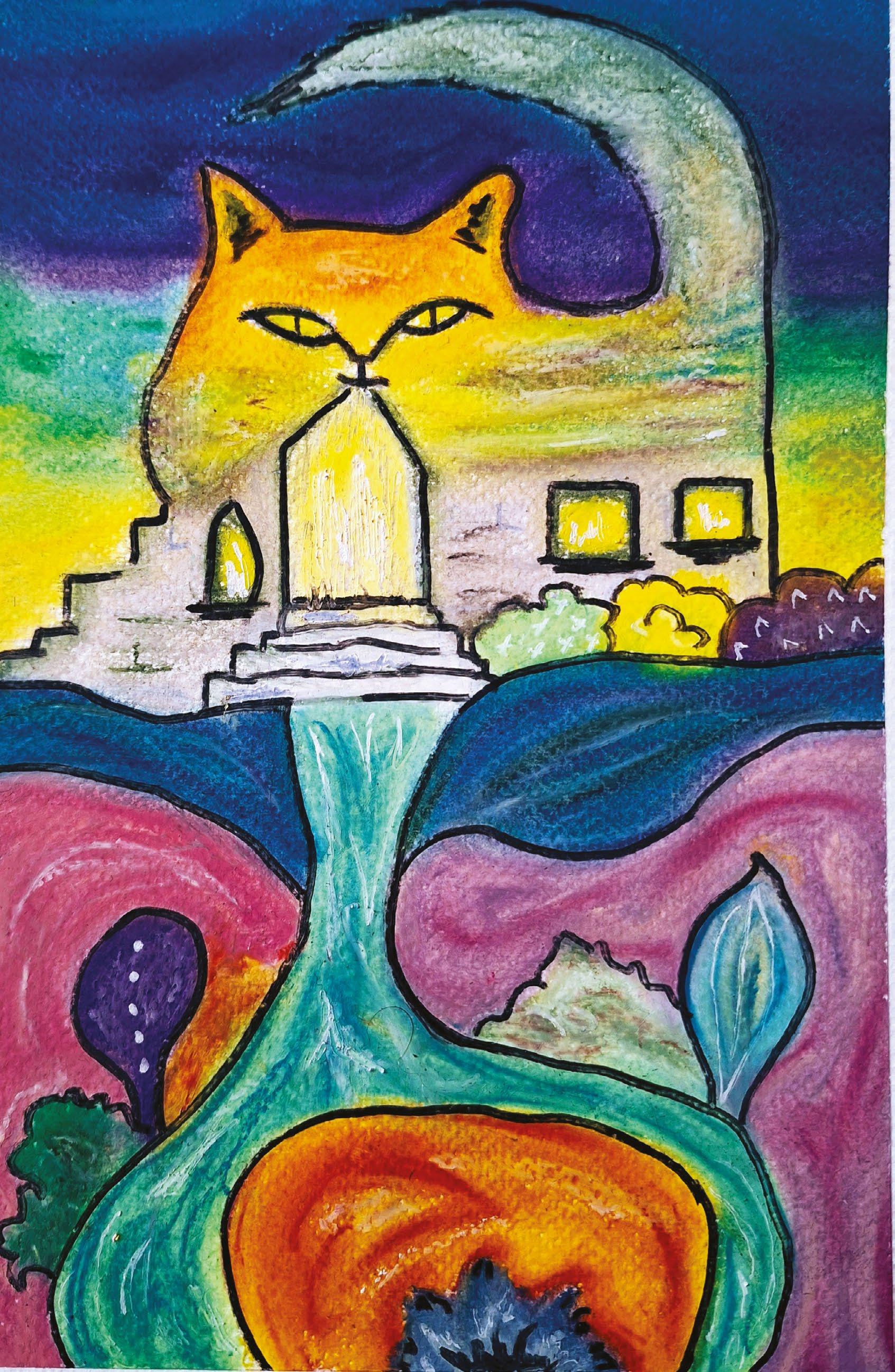
Love is love
By Natalie
© Natalie 2024
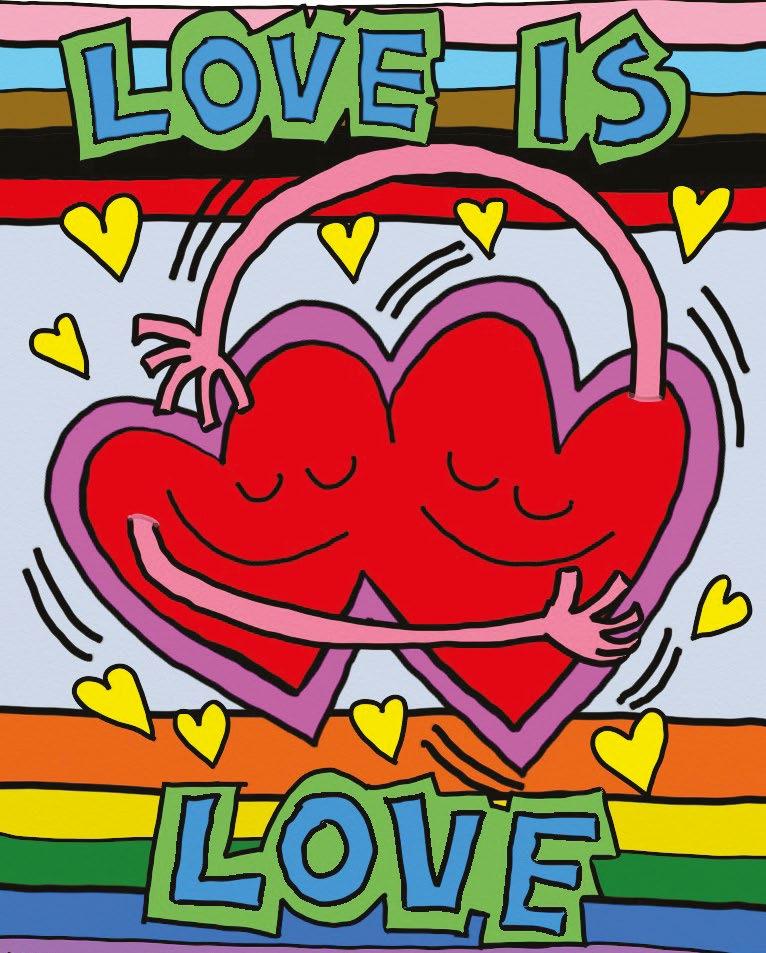
Why do so m any autistic people slip through the gaps?
By Courtney SB Cazzer
© Courtney 2024
As an autistic adult, a lot of the time I treat others how I would love to be treated. I offer others more choice than I do for myself as my neurodivergent differences make me afraid of neglect. I prefer to give freedom to others, to feel safe and that I’ll be okay. I offer lots of nice sayings, etc; choices, opportunities, and I get too burnt out to care what I want, as in the end, I seem to give up due to the expectations I’m placing on myself.
Every day, I live as if it’s my last day because I have anxiety. With my depression, it keeps me alive. Anxiety makes me scared of death. If you’re reading this, please don’t see yourself as broken, being autistic. Panic attacks can feel like you’re dying, but you’re strong – reach out for help. There’s nothing wrong with being a warrior. It makes us who we are.
Being selectively mute, for me, isn’t always understood either. It’s like an inability to feel pleasure from verbalising and I’m often not taken seriously – to the point where people try to paint who I am as a ‘behavioural’ person on the spectrum. People sort of make me feel little when I’m still an adult with capacity. I would love to talk. It isn’t a choice though: adults can get selective mutism. It is common for autistic maskers. They can feel alienated and isolated. It’s just like how OCD can affect people: they don’t love cleaning! But anxiety does so many things to the human body. Especially to a neurodivergent’s brain and body. I try to educate. I share love and spoons. Every human is valid, and special needs matter, even if somebody masks their autism very well.
I wish we lived in a world with no stigma. We need love and acceptance. Everybody deserves to feel safe. Every human should feel like they matter and they are appreciated.
To everyone reading: never lose hope –you’re strong. And to all autistic teens: you’re not broken, you’re a trooper, and carrying on is a blessing to earth because autism is a different neurotype in many forms and shapes, like autistic profiles.
The majority of humans or teachers don’t know how to help rare needs on the spectrum. But it doesn’t mean you’re weird or don’t need help. Kids often experience outbursts, which lead to misdiagnosis of Oppositional Defiant Disorder (ODD) and behavioural conditions. I want to spread awareness that kids struggle too – you’re never too young to stress. And men shouldn’t be afraid to ask for help. Everybody deserves to feel like they belong on earth, no matter what they struggle with. Let’s break the stigma and love one another. Find freedom in our abilities and share our love and offer one-to-one time for one another.
Kids will thrive if understood. Punishing disabilities – such as through reward systems – is so traumatising. I hope to save lives and educate everyone. As when I was a teen, I never knew what anxiety was. I hope to make this world a better place for all warriors on the spectrum.
Autism in the lyrics of Stop making sense
By Tom © Tom 2024
The 2023 re-release of Jonathan Demme’s 1984 concert film Stop making sense, which documents a run of live shows by the new wave band Talking Heads, has sparked fresh discussion on the positive way in which frontman David Byrne’s autism is presented. The film has been labelled a ‘landmark’ in neurodivergent representation (by Raine Petrie in a 2023 Little white lies article titled ‘David Byrne and the autistic euphoria of Stop making sense)’.
This essay seeks to explore how the lyrical content of the songs chosen for the film, and how they are then presented on-screen, contribute to this reputation. Byrne’s lyrics, whilst often complex, contain multiple references to the autistic experience and explicitly cover topics including social communication differences, alexithymia and masking.
The film opens with the song Psycho killer, and what could be seen as a statement by Byrne on the impact of the social communication differences that many autistic people face. Wide-eyed and jolty, Byrne positions himself as the titular ‘psycho’, isolated on stage and the sole subject of the audiences’ gaze. After laying out the thesis of the song in the first verse and chorus, Byrne uses the second verse to delve into the detail of what the character (and thus he himself) struggles with:
You start a conversation, you can’t even finish it.
You’re talkin’ a lot, but you’re not sayin’ anything.
When I have nothing to say, my lips are sealed.
Say something once, why say it again?
Article
A difficulty with social communication is one of the main areas that allows one to qualify for an autism diagnosis, with the National Autistic Society detailing that “most” autistic people struggle with both “interacting with” and “understanding or relating” to other people (on the 2020 web page Understanding and developing communication). In the verse above, Byrne details what seems to be a struggle interpreting small talk (the subject is “talkin’ a lot” without “sayin’ anything” meaningful), and then how to appropriately respond to it – a commonly reported issue amongst those on the autism spectrum.
By framing the character as an isolated ‘psycho’, Byrne could be highlighting the impact that social communication difficulties can have on the autistic individual, such as finding it harder to take part in “everyday family, school, work and social life”, and how that then causes them to be negatively perceived by society as a whole.
In I zimbra, an outtake from Stop making sense which appears in some home video and soundtrack albums of the film, Byrne goes one step further by using lyrics that are from no language at all. Instead, he communicates through made-up words and syllables adapted from Dadaist poet Hugo Ball’s work Gadji beri bimba. Ball “didn’t ask that listeners should understand his lines, but hear pure sounds” wrote Carol Rumens in a 2009 Guardian article ‘Poem of the week: Gadji beri bimba by Hugo Ball)’. Arguably, the freedom to express oneself verbally without conforming to a specific set of rules or customs that traditional language provides is an inherently autistic experience – one which seeks to
communicate through not what should be said or done, but what feels right for the individual.
Another topic often covered in the lyrics of Stop making sense is alexithymia. In short, alexithymia is the inability to identify and describe feelings and emotions that occur in both oneself and others, and is reported by up to 70% of autistic people (as opposed to up to only 13% of the general population) according to Embrace autism’s 2020 Alexithymia & autism guide web page.
In This must be the place (naive melody), Byrne punctuates a description of the physical sensations of falling in love with the line “I guess I must be having fun,” drawing attention to the narrator’s uncertainty regarding their own emotions and also what emotions are expected of them. Furthermore, the title of the song, which comes from the line “I guess that this must be the place” (a line which is similarly positioned to the one previously mentioned), further reinforces this idea of emotional uncertainty.
Similarly, in Once in a lifetime, the narrator is pre-occupied with asking questions (“Am I right?... Am I wrong?”) in the wake of a sudden existential crisis. Both examples could be seen as a way of Byrne using the role of a songwriter, one which is ostensibly concerned with artistically expressing emotions in a universally understandable way, to in fact draw attention to an autistic inability to do just that.
Finally, many of the lyrics from Stop making sense address the concept of masking, and the benefits of unmasking the autistic self. Masking, sometimes known as camouflaging, is defined by the National Autistic Society as the strategies used by many autistic people to “appear non-autistic”, often with the intention of trying to “blend in and be more accepted [by] society”. These can include behaviours ranging from “mirroring others’ […] facial expressions [and] dress sense” to “forcing eye contact”. Masked
behaviours can be both conscious and unconscious, and learned from sources ranging from their peers to the media. Whilst, to the outsider, this may seem an entirely advantageous practice, masking has been linked to negative outcomes ranging from physical exhaustion to suicidality (see the National Autistic Society’s 2024 web page Masking).
In fact, Byrne directly addresses this issue, from a more personal perspective, in the opening lines of Crosseyed and painless:
Lost my shape – trying to act casual! Can’t stop – I might end up in the hospital I’m changing my shape – I feel like an accident
They’re back! – To explain their experience
How this song is treated within the context of the film also holds some significance. It is the final number of the film, and therefore one of three which feature Byrne’s iconic ‘big suit’ – an oversized version of what he wears earlier on in the show, and a costume which is inspired by the theme of masking. In an interview with the BBC radio programme Desert island discs in 2018, Byrne stated that, when performing early live shows, he wanted to “camouflage” himself as an “everyman” by wearing a business suit. This idea was later transformed into the idea of the “man [then] being lost in his suit” – or, in other words, a way of reflecting the damaging effect trying to fit in (masking) can have upon the individual. Moreover, this song is the only one in the film to contain direct shots of the audience, further emphasising the theme of Byrne attempting to fit in with those around him.
Stop making sense has been described by critic Raine Petrie (in the 2023 Little white lies article) as showing off the “autistic euphoria” associated with unmasking (the act of consciously challenging and removing learned masked behaviours), and Byrne certainly reflects this in his lyrics. For example, in Thank you for sending me an angel, the narrator
addresses the audience and states: “You can walk, you can talk just like me”. This, coupled with the assurance that they “won’t see nothing like [him]” can be seen as an autistic call-to arms, an open invitation to reveal one’s true self and revel in the process of doing so.
In conclusion, the lyrical content of the songs chosen for Stop making sense, paired with how they are presented on screen, highlight many aspects of the
The pluviophile
By Holly © Holly 2024
“Miserable weather today, isn’t it?” If I had a pound for every time I am out walking in the rain and hear this phrase from a passerby, I could have put a downpayment on a nice cottage in the Highlands of Scotland by now. Normally, my reaction would be to smile and make a counter comment about it being great weather for ducks (admittedly the English in me rising to the surface). However, there are times in which I wish I could stick up for my complete, most ardent love for the rain.
To me, rain is the visual manifestation of a mental and emotional reset. I could, without reservation, sit contentedly by myself and watch the rain falling for hours with unwavering attention, not at any point wanting to look away for a second. Silently watching the droplets ricocheting off rooftops, gutters filling up, the steady overflow trickling down onto the pavements, shimmering mirrors slowly developing in the camber of paths. I can feel my worries and anxieties dissolving, a sudden wave of warmth flowing through
autistic experience, both positive and negative. By using his unmasked, autistic voice to cover such content, Talking Heads frontman David Byrne creates not only a persona for the wider neurodivergent community to look up to, but also puts their experience literally on a stage for them, and for the rest of the world, to celebrate.
Article
me, I no longer feel by myself, but with myself.
The world can undoubtedly feel uncertain and ever-changing at times, thus I crave the grounded feeling I get from sitting alone, with a well-thumbed book propped open on my lap, hearing the rain pattering on my window. It is in these moments where I seem to detach from the world. For a mere few hours, I am alone in my existence, yet a single feeling of loneliness not once entering my mind. In other words, the rain brings me home to myself. It allows me to put to one side for a moment life’s trials and tribulations, and causes me to instead focus more intentionally on what really matters to me.
Ultimately, the rain is home, a more soothing experience I simply could not name. It is for me both a mental retreat and an emotional need. It is my elixir, and I hope to drink up many more rainy days in the future.
The world’s built on a neurotypical beat
By Fuzzy Logik
© Fuzzy Logik 2024
You hold the myth tight, the stereotype — Wrap it ‘round our skin, Like we don’t see the box you’ve been putting us in.
You dangle the prize, Shiny and bright — Acceptance —
But only if we move within your lines, If we tell the truth, but not too loud, If we fit the mould but aren’t too proud,
Never be too proud.
The world’s built on your beat, A rhythm we’re told we gotta meet, Told to morph, to blend, Shapeshift, code-switch, we glitch.
Just be like us,” you say with a smile, But every step forward feels like a mile. We’re the ones who bend, We’re asked to twist and change, to shrink to rearrange. You say — Work harder — be more, Always more.
As if we are incomplete at our core.
It’s the same old lie, Just a new disguise — To assimilate.
You call it “progress,” Like it’s evolution, It’s just another illusion.
The change you ask? It’s always in us — on us —
Like we’re the problem, Like we’re the fuss.
Because our truth is too much. We are too raw, too real, too loud, too much,
A blazing storm you’re scared to touch.
We’re taught to hate what makes us real, Taught to hide what we feel, Until we don’t even know who we are, It’s buried deep. wounds leave scars.
And so we march, and twist, and blend, Unsure of where we start, or end.
Reading glasses
By Marilyn © Marilyn 2024
Artwork

Sissinghurst
By Clive
© Clive 2024
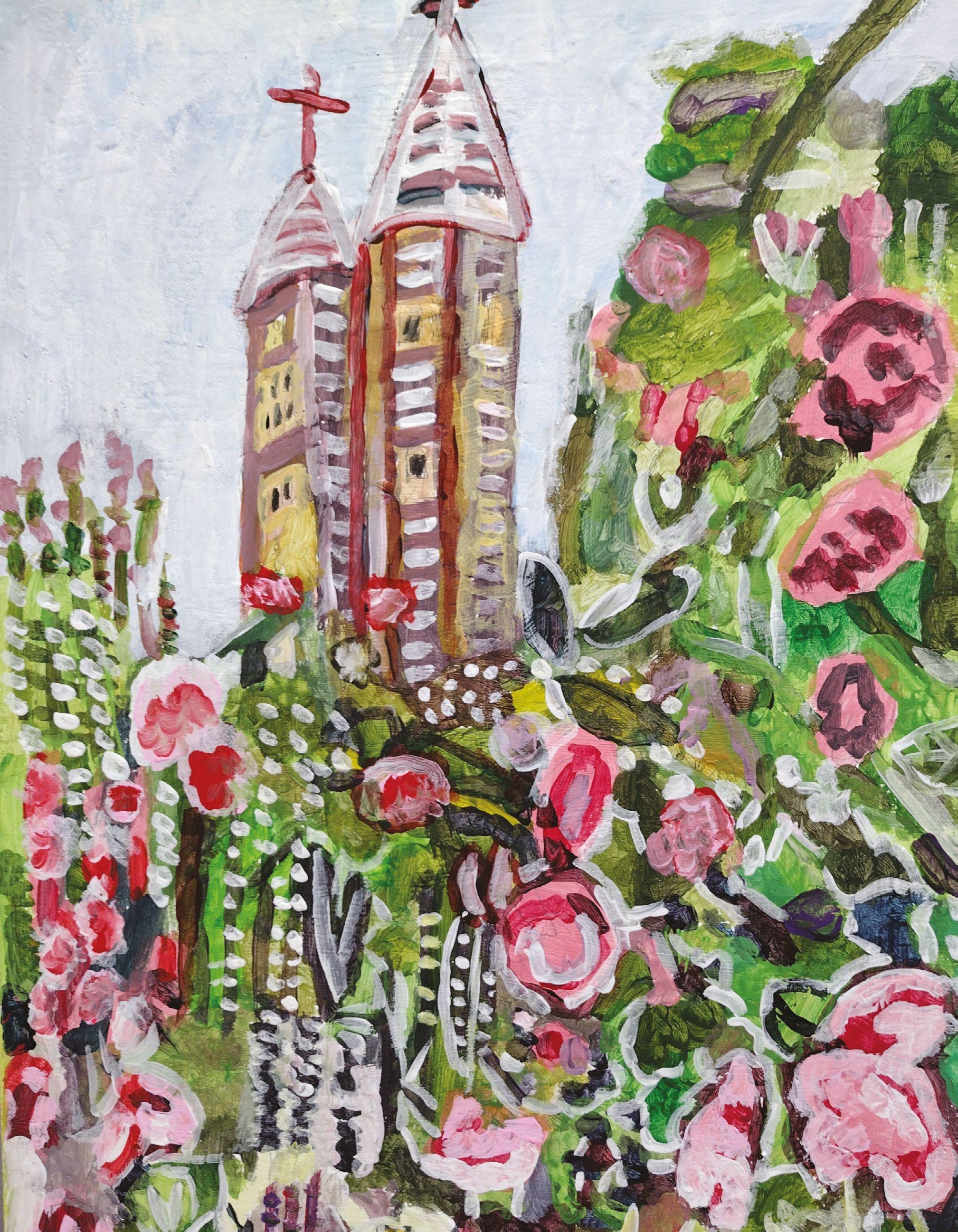
Struggling at work
By Deborah
© Deborah 2024
I wasn’t aware of autism as a child, but I’ve always been different from as far back as I can remember. I’m what I describe as a ‘background person’. I hate being put on the spot or having an ‘audience’. The quiet one at the back of the class in school who doesn’t want to be asked any questions and avoids eye contact to lessen that chance.
I’ve always struggled with social interactions and speaking in front of people. I would never question things, just accepted what was said or expected. Misunderstanding certain things that have been said, taking longer to process things and not understanding instructions. And don’t even get me started on directions – I still get left and right mixed up until I really think about it.
When I worked in retail in my role as supervisor, I struggled so much in some areas of my work that I was eventually asked to step down. It really hurt at the time, in fact it still does now because I now know there was a reason for it. But at the time, I wasn’t aware. I was always being told by my manager that I had been rude or been responding harshly to people, but I really didn’t feel I was. It was an improvement on barely speaking to anyone at all like I did at school, but still it didn’t feel very nice never knowing if what you were saying was ‘acceptable’. I often wonder if I knew a bit more about myself back then like I do now, how different things would have been.
Over the past few years I have become tired, I guess, of always
feeling like I have to work harder in social situations or workplaces to achieve anything. Frustrated, and wanting to find out more about why I struggle with these things. I think the main turning point was when I had my little one in 2016. I really pushed myself to take him to things like baby sensory classes and even arranged ‘mummy meet-ups’ with the little ones, seeing other mums bonding and forming friendships. But still I struggled, even when I thought it would be easier with having at least one thing in common.
I wanted to find out how to help myself better and know what was causing my struggles, so I contacted a mental health charity for advice early 2020 (before lockdown). But after they replied, I did nothing else in relation to seeking support or advice. I hadn’t really planned to take it any further until I began to feel very anxious and stressed around June/July 2021, a couple of months before my little one started school. Just after he started, I realised that what was causing me to feel so unwell was all the feelings and thoughts I was having of my own school experiences and the worry that my son would go through the same issues.
I decided it was time to seek that help.
In December 2021 I referred myself to the staff counselling team my workplace provides (I work for a mental health NHS Trust) and was assigned to a counsellor in January 2022. I spoke through everything with him and was signposted to a local service where I could look into a possible autism diagnosis.
When I was gathering everything together from over the years for my referral, it was like an emotional rollercoaster. I thought this would be the solution and make me feel better taking action, so I was not really expecting to find this part of the process quite draining. It took me a further 14 months to actually make an appointment with my GP. I was making excuses and putting it off, plus my little one was also referred and going through the system, so I used the excuse of finding out how he gets on before I proceed with mine. There was also just too many appointments going on with this and that, I couldn’t cope with any more.
My little one was diagnosed as autistic in June 2022, so I decided it was time for me to proceed. I contacted my GP surgery, made the referral, completed the questionnaires and am now on a
Churchyard
By Michael © Michael 2024
waiting list for an assessment. I have worked for my NHS Trust since 2014. In 2018, I joined our Neurodiverse Group, and in 2021 I became the lead of our Disability Staff Network.
I feel thankful to be part of an amazing and diverse workplace who understand and encourage people to be themselves. I do struggle at times –I don’t think that will ever change – not just in my paid role but also in leading the staff network. But I will keep fighting and powering on, as that’s all I can do. And I am also grateful that there’s so many amazing resources out there for what I need for myself and as a parent of an autistic child. We are learning together, and I feel I can understand some of what he may be experiencing.
Artwork
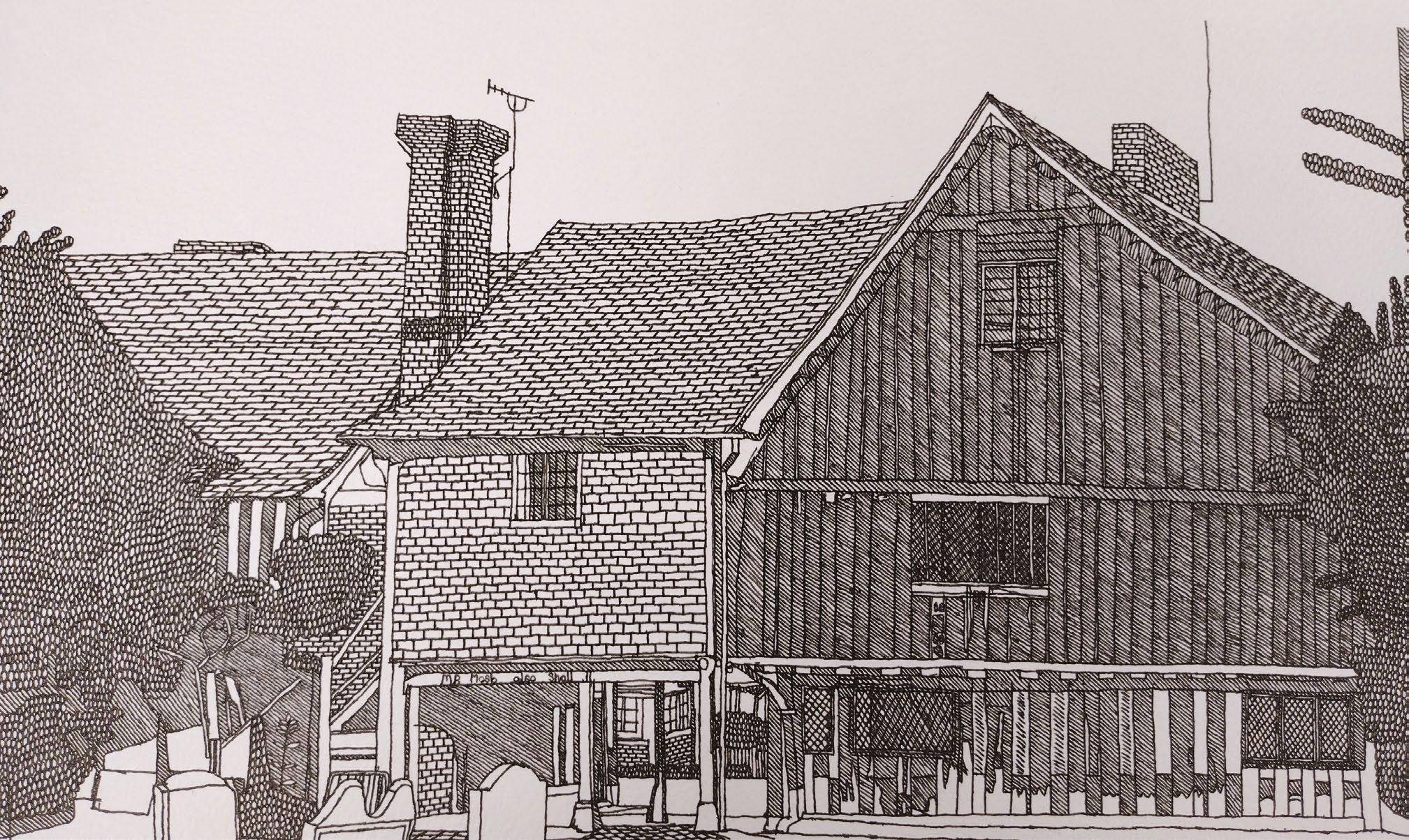
Artwork
By Michael
© Michael 2024

Girl
Yes, we can socialise
By Robert © Robert 2024
Throughout my life, as an autistic person, I have been fortunate to have great moments where I have been able to socialise and gain friendships. There were also times where, due to my misunderstanding of certain social situations and the anxiety that comes with it, this has been difficult for me and has led to me feeling lonely. Such feelings of loneliness are not uncommon among our community. This loneliness has even led to dire results for us. The truth of the matter is that we autistics can be social creatures if we are able to socialise on our terms.
Each autistic person is different when it comes to how much socialisation they want in their life. There are a good number of us who want to thrive socially in our lives. We want to gain such experiences and know that it will be fulfilling for us. With that said, it must be noted that we may socialise differently from our neurotypical peers.
In fact, fellow autistic writer Pete Wharmby wrote in his 2022 book, Untypical, pointers to keep in mind when it comes to how we socialise. Some autistics might not be consistent in their interactions with others. This does not mean that the autistic person does not value a relationship. Friendship is greatly valued and that friendship may just work differently for us. Wharmby explains that there are some of us who rather interact online rather than in person. This does not mean that the autistic person does not want to meet up with someone.
The autistic person might just feel less stressed by interacting online. Wharmby adds that there are also some of us who might mentally tire out from being at an event for too long and might leave early. This does not mean that they are not enjoying the company or having a good time. In fact, they might have an amazing time. It could just be the case that the autistic person might be drained from too much social interaction and would need to recharge.
Like I stated before, much of this differs with each autistic individual. However, of all the tips Wharmby gives, I relate to the last one the most. There have been many times where I would go to social events with friends and enjoy myself. I would love every minute of it and even become the life of the party. The ‘belle of the ball’ if you can say that. However, there are times when I would need to leave early because I might get sensory overload. Nevertheless, I still have a good time and go to more in the future. I just need to recharge my batteries, that’s all.
The bottom line is that we autistics can socialise with others. Many of us have different ways to socialise and we need to do it on our own terms. This helps to make it all possible. We can reach a social goal, if it is done our way.
Unm asking
By Sara
© Sara 2024
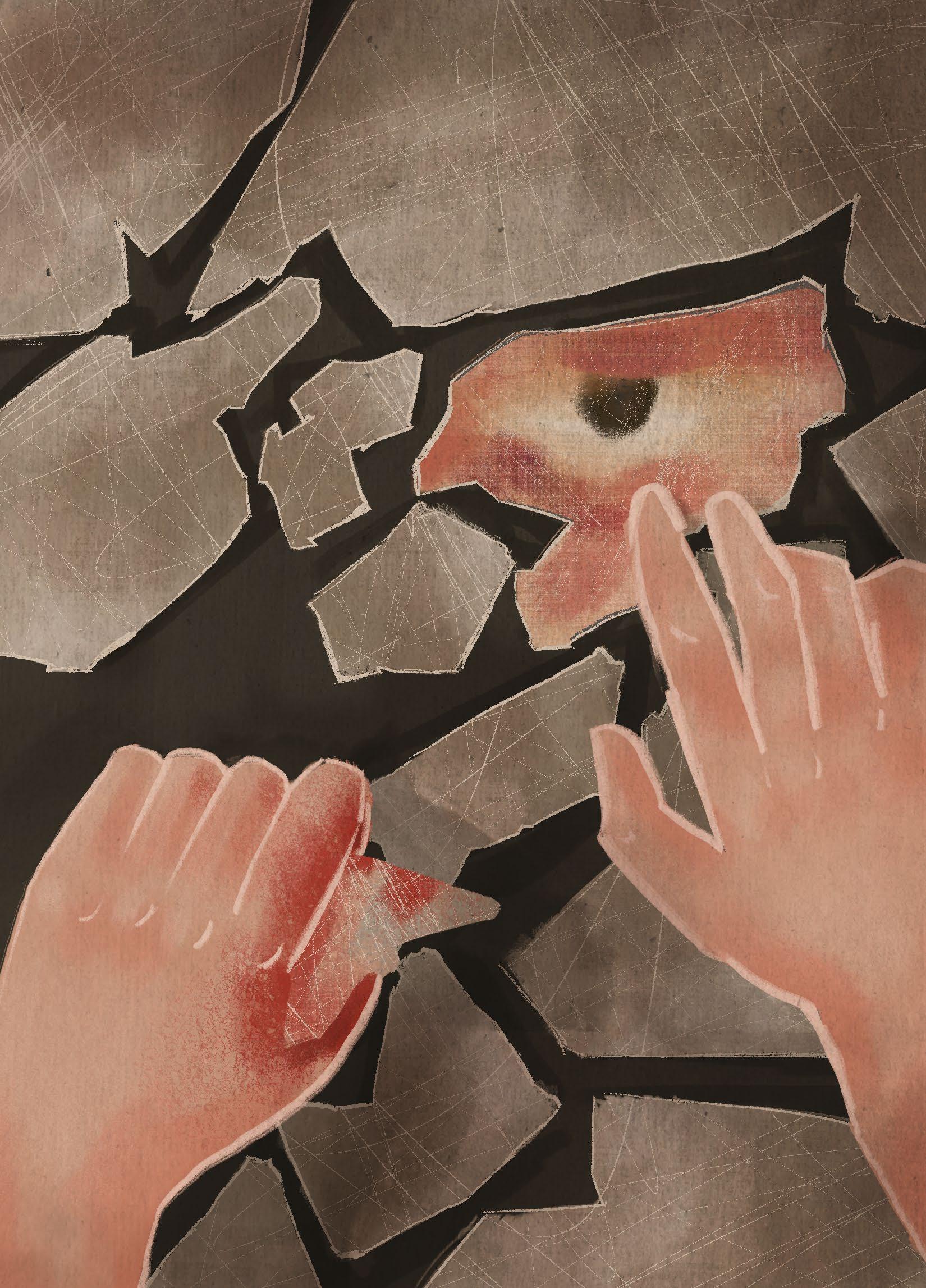
Eye contact
By Angelica © Angelica 2024
I never liked eye contact. But getting any feedback? They might as well have laughed, gleefully.
When I never learned nuance fully. They never actually laughed in any way. But they never offered help getting through the day. They would offer a cup of tea. Then they started talking at me… This world is reciprocal. Although my mind is full. They think it is blank. For that, I have them to thank. When I turned seven they stopped making eye contact.
I thought I had won after escaping this social contract.
How to subscribe to the print magazine
A subscription will pay for printed issues of the magazine (four) a year.
To subscribe, you can:
• visit our online shop at www.autism. org.uk/shop/products/magazines/thespectrum
• email our Supporter Care team at: supportercare@nas.org.uk and they will send you a subscription form
• or call our Supporter Care team on 0808 800 1050.
If you move house, please email supportercare@nas.org.uk and include your name and your new and old address.
But every glance away comes at a price. If I needed help, I would try to blink twice. She had already turned around. As I tripped over my shoelace on the ground.
They don’t laugh, they never do. But their silence, we can never undo. I never liked eye contact.
My eyes are starting to retract.
My hands are starting to be too weak to wave.
My body is shaking, I was never that brave.
I don’t like it.
Shoes that never fit.
Eye contact.
I never tried it.
How to renew your print subscription
Please complete the subscription form enclosed with your copy of the magazine and return it to us with payment in the prepaid envelope.
To renew by telephone, call our Supporter Care team on 0808 800 1050 and a member of the team will process your renewal.
How to unsubscribe
To unsubscribe from the print version, email supportercare@nas.org.uk and include your postal address.
By Ruby © Ruby 2024
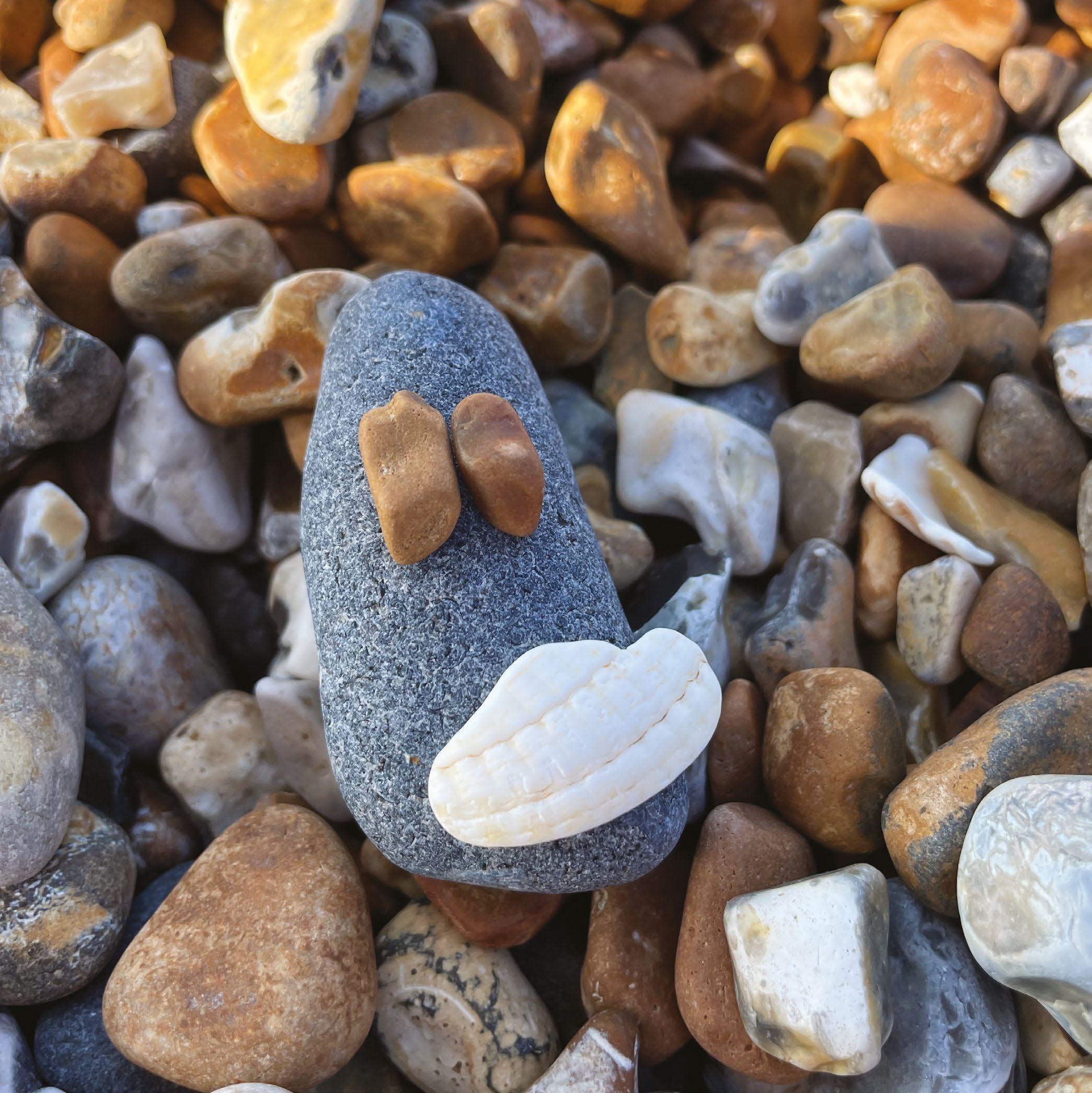
Email: spmag@nas.org.uk
Website: www.autism.org.uk/thespectrum
Except where stated, all material © National Autistic Society 2024

